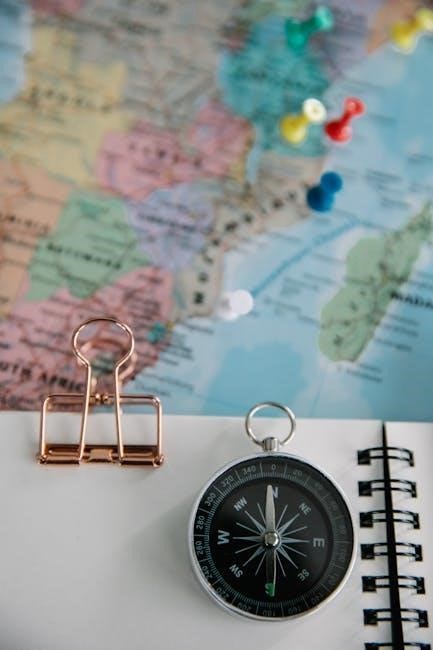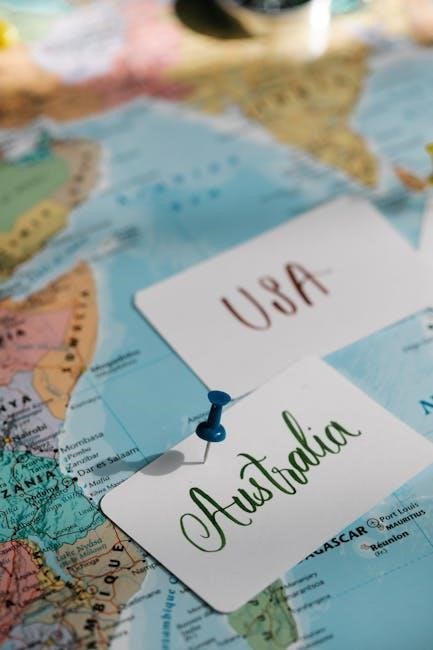AP World Unit 5 explores global history from 1900 to the present‚ focusing on conflict‚ globalization‚ and societal transformations. It equips students with critical thinking and analytical skills to understand modern global dynamics.
1.1 Key Themes and Time Period
Unit 5 covers 1900 to the present‚ focusing on global conflict‚ Cold War dynamics‚ decolonization‚ nationalism‚ and economic shifts. Key themes include World Wars‚ totalitarian regimes‚ technological advancements‚ and globalization’s impact on societies. This period highlights the interconnectedness of the modern world and its transformative events.
1.2 Importance of Unit 5 in AP World History
Unit 5 is crucial as it bridges the past and present‚ emphasizing global interconnectedness and modern challenges. It helps students understand the roots of contemporary issues‚ fostering analytical and critical thinking skills essential for AP exams and college-level history studies.
Global Conflict (1900-1945)
This period covers World War I and II‚ focusing on causes‚ consequences‚ and the rise of fascism. It highlights global tensions‚ military strategies‚ and economic instability shaping modern history.
2.1 Causes of World War I
The causes of World War I included imperialism‚ militarism‚ alliances‚ and nationalism. Imperial rivalries over colonies and resources‚ military build-ups‚ complex alliances‚ and nationalist tensions created a volatile environment. The assassination of Archduke Franz Ferdinand triggered the war‚ while underlying factors like the Balkan crises and economic competition exacerbated tensions globally.
2.2 Consequences of World War I
World War I led to massive human losses‚ economic devastation‚ and political upheaval. The Treaty of Versailles imposed harsh penalties on Germany‚ fostering resentment. Empires collapsed‚ new nations emerged‚ and colonial territories were redistributed. The war also spurred the rise of fascism‚ communism‚ and nationalism‚ setting the stage for future global conflicts.
2.3 Rise of Fascism and Nationalism
The aftermath of World War I saw the rise of fascist and nationalist movements. Economic instability‚ political turmoil‚ and the Treaty of Versailles created fertile ground for authoritarian leaders like Mussolini and Hitler. These regimes emphasized militarism‚ racial purity‚ and national superiority‚ laying the groundwork for future global conflict and World War II.
2.4 Causes and Impact of World War II
World War II arose from fascist aggression‚ Appeasement policies‚ and unresolved Treaty of Versailles issues. It caused unprecedented devastation‚ 70-85 million deaths‚ and economic collapse. The war led to the Holocaust‚ reshaped global power structures‚ and prompted the emergence of the U.S. and USSR as superpowers‚ setting the stage for the Cold War.
The Interwar Period
The Interwar Period (1918-1939) saw economic instability‚ political extremism‚ and rising totalitarian regimes. Global tensions escalated‚ setting the stage for World War II’s outbreak in 1939.
3.1 The Treaty of Versailles and Its Failures
The Treaty of Versailles (1919) ended WWI but imposed harsh penalties on Germany‚ including heavy reparations and territorial losses. The “war guilt” clause fueled resentment‚ while its failure to establish a lasting peace contributed to WWII’s outbreak and the rise of fascist regimes in Europe.
3.2 Economic Instability and the Great Depression
The Great Depression‚ beginning with the 1929 stock market crash‚ led to widespread unemployment and global economic downturn. Protectionist policies like the Smoot-Hawley Tariff exacerbated the crisis‚ while political instability and the rise of extremist movements further complicated recovery efforts worldwide.
3.3 Rise of Totalitarian Regimes
The interwar period saw the rise of totalitarian regimes in Europe and Asia. Fascist leaders like Mussolini in Italy and Hitler in Germany exploited economic instability and nationalism to seize power. Similarly‚ Stalin’s Soviet Union and Mao’s China implemented authoritarian rule‚ suppressing opposition and controlling media to maintain power and ideology.

The Cold War (1945-1991)
The Cold War was a decades-long ideological and geopolitical conflict between the U.S. and the Soviet Union‚ marked by proxy wars‚ arms races‚ and a struggle for global influence.
4.1 Origins of the Cold War
The Cold War originated from post-WWII tensions between the U.S. and the Soviet Union‚ driven by ideological differences‚ territorial disputes‚ and the desire for global influence. The Truman Doctrine and the Marshall Plan highlighted these divisions‚ leading to a prolonged state of political‚ economic‚ and military rivalry.
4.2 Key Events of the Cold War
Key Cold War events include the Berlin Blockade (1948-1949)‚ Cuban Missile Crisis (1962)‚ Korean War (1950-1953)‚ and Vietnam War (1955-1975). The Hungarian Uprising (1956) and the construction of the Berlin Wall (1961) showcased ideological divides. These events highlighted the geopolitical tensions and proxy conflicts that defined the era.
4.3 Proxy Wars and Their Impacts
Proxy wars‚ like the Korean and Vietnam Wars‚ allowed superpowers to influence global politics without direct confrontation. These conflicts fueled regional instability‚ drained resources‚ and caused significant human suffering. They also deepened Cold War tensions‚ as both sides sought to expand their ideological influence while avoiding direct military conflict.
4.4 The Arms Race and Technological Advancements
The Cold War arms race drove unprecedented technological innovation‚ particularly in nuclear weaponry and space exploration. The USSR’s Sputnik and the U.S. Apollo 11 moon landing exemplified this rivalry. Such advancements showcased scientific prowess but also escalated tensions and diverted resources‚ leaving lasting impacts on global security and societal progress.
Decolonization and Nationalism
Decolonization reshaped global politics as nations sought independence from colonial powers‚ fostering nationalist movements and redefining international relations in the 20th century.
5.1 Causes of Decolonization
Decolonization was driven by post-WWII economic strain‚ rising nationalism‚ and the spread of democratic ideals. Colonized peoples resisted oppressive regimes‚ while global superpowers promoted self-determination‚ weakening colonial empires and accelerating independence movements globally.
5.2 Impact of Decolonization on Global Politics
Decolonization reshaped global politics by ending European dominance and creating new nations. It led to the Cold War rivalry‚ as the U.S. and USSR courted newly independent states. The rise of the Non-Aligned Movement and global South solidarity countered colonial legacies‚ fostering a multipolar world order.
5.3 Rise of Nationalist Movements
Nationalist movements emerged globally‚ driven by shared identity‚ culture‚ and resistance to colonialism. Leaders leveraged history and ethnicity to unify groups‚ often sparking independence struggles. These movements reshaped borders‚ fostered pride‚ and sometimes fueled conflicts‚ profoundly influencing modern political landscapes and identity formation worldwide.

Economic and Cultural Changes
Unit 5 examines the transformation of economies and cultures‚ emphasizing globalization‚ technological advancements‚ and cultural exchanges. These shifts reshaped societies‚ fostering interconnectedness and influencing economic policies worldwide.
6.1 Globalization and Economic Integration
Globalization and economic integration transformed the world by fostering international trade‚ investment‚ and cultural exchange. Technological advancements and multinational corporations drove this process‚ creating interconnected economies. While it spurred economic growth‚ it also raised concerns about inequality and cultural homogenization‚ shaping modern global dynamics and challenging traditional economic policies worldwide.
6.2 Social and Cultural Movements
Social and cultural movements reshaped societies‚ fostering equality and justice. Movements like civil rights‚ feminism‚ and environmentalism gained momentum‚ influencing global policies. Grassroots activism and technological advancements amplified their reach‚ creating a more interconnected world where diverse voices demanded change‚ challenging traditional norms and promoting inclusivity across regions and cultures.
6.3 Role of Technology in Shaping the Modern World
Technology has revolutionized modern society‚ driving globalization and economic transformation. Innovations like the internet‚ digital tools‚ and automation have reshaped industries‚ fostering connectivity and efficiency. However‚ they also raise ethical concerns‚ such as privacy issues and job displacement‚ highlighting the dual impact of technological advancements on global progress and human life.

Collapse of the Soviet Union and Its Aftermath
The Soviet Union collapsed in 1991 due to economic instability‚ political corruption‚ and rising nationalism. Its dissolution led to the emergence of independent states‚ reshaping global geopolitics and economies.
7.1 Reasons for the Collapse
The Soviet Union collapsed due to economic stagnation‚ political corruption‚ and ethnic nationalism. Central planning failed to adapt‚ leading to resource mismanagement and declining living standards. Mikhail Gorbachev’s reforms‚ glasnost‚ and perestroika aimed to revitalize the system but instead accelerated its demise by exposing systemic flaws and empowering dissent.
7.2 Impact on Global Politics and Economy
The Soviet Union’s collapse ended the Cold War‚ reshaping global politics and economies. It led to the rise of the U.S. as a sole superpower and the expansion of capitalism. Former Soviet states transitioned to independent governments‚ facing economic instability and inequality. This shift influenced global security‚ trade‚ and the rise of new geopolitical alliances.

Contemporary Global Issues
Contemporary global issues include climate change‚ pandemics‚ economic inequality‚ and technological advancements. These challenges require international cooperation and innovative solutions to ensure a sustainable and equitable future.
8.1 Challenges of the 21st Century
The 21st century faces critical challenges‚ including climate change‚ pandemics‚ economic inequality‚ and technological disruptions. These issues demand global cooperation‚ sustainable solutions‚ and adaptive strategies to mitigate their impact on societies and ecosystems worldwide.
8.2 Role of International Organizations
International organizations play a crucial role in addressing global challenges by fostering cooperation‚ diplomacy‚ and economic stability. Bodies like the United Nations‚ IMF‚ and WHO work to promote peace‚ public health‚ and sustainable development‚ ensuring a coordinated response to global crises and advancing international relations in an increasingly interconnected world.

Study Tips for Unit 5
Master Unit 5 by focusing on active recall‚ flashcards‚ and concept maps. Practice timed essays‚ analyze primary sources‚ and engage in study groups to reinforce understanding effectively.
9.1 Key Concepts to Focus On
Focus on understanding global conflicts‚ Cold War dynamics‚ decolonization‚ and economic shifts. Analyze causation‚ continuity‚ and change over time. Prioritize themes like imperialism‚ nationalism‚ and technological advancements. Practice identifying patterns and connections across different regions and historical events to build a comprehensive understanding for the AP exam.
9.2 Effective Study Strategies
Utilize active reading and note-taking techniques. Create concept maps and timelines to visualize historical patterns. Engage with practice questions and sample essays to refine writing skills. Collaborate with peers for discussion and review. Regularly review and reflect on key concepts to reinforce retention and understanding of complex material effectively.

Practice Questions and Review
Engage with practice questions to test knowledge and identify weak areas. Regular review sessions help reinforce concepts and improve retention for exam success.
10.1 Sample Essay Questions
Sample essay questions help students practice articulating historical analysis. Topics include causes of global conflicts‚ impacts of decolonization‚ and technological advancements. Practice with prompts like: “Analyze the role of nationalism in World War I” or “Explain how globalization reshaped economies.” Regular practice enhances writing and critical thinking skills for the exam.
10.2 Multiple-Choice Practice
Multiple-choice questions test factual knowledge and conceptual understanding. Practice questions cover topics like global conflicts‚ Cold War events‚ and decolonization. Strategies include eliminating incorrect answers and focusing on key terms. Regular practice helps identify weak areas and reinforces retention of essential details for exam success.
Unit 5 concludes with a comprehensive review of global transformations‚ emphasizing critical thinking and historical context. Mastering these concepts prepares students for success in AP World History and beyond.
11.1 Summary of Key Points
Unit 5 covers global conflict‚ Cold War dynamics‚ decolonization‚ and economic shifts. Key themes include World Wars‚ totalitarian regimes‚ proxy wars‚ and globalization. Understanding these events is crucial for analyzing modern global structures and historical continuity.
11.2 Final Thoughts and Encouragement
Mastering Unit 5 requires dedication and proactive learning. Focus on analyzing global trends‚ understanding causation‚ and connecting historical events to modern contexts. Stay organized‚ practice consistently‚ and engage with diverse perspectives. With persistence‚ you’ll excel in this unit and develop a deeper understanding of the world’s complex history and its relevance today.